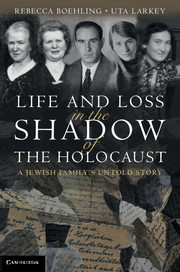Book contents
- Frontmatter
- Contents
- List of figures
- Acknowledgments
- Family trees
- 1 Introduction
- 2 German-Jewish lives from emancipation through the Weimar Republic
- 3 Losing one's business and citizenship: the Geschwister Kaufmann, 1933–1938
- 4 Professional roadblocks and personal detours: Lotti and Marianne, 1933–1938
- 5 The November Pogrom (1938) and its consequences for Kurt and his family
- 6 New beginnings in Palestine, 1935–1939: Lotti and Kurt
- 7 Rescuing loved ones trapped in Nazi Germany, 1939–1942
- 8 Wartime rumors and postwar revelations
- 9 Epilogue
- Notes
- Bibliography
- Index
5 - The November Pogrom (1938) and its consequences for Kurt and his family
Published online by Cambridge University Press: 05 June 2012
- Frontmatter
- Contents
- List of figures
- Acknowledgments
- Family trees
- 1 Introduction
- 2 German-Jewish lives from emancipation through the Weimar Republic
- 3 Losing one's business and citizenship: the Geschwister Kaufmann, 1933–1938
- 4 Professional roadblocks and personal detours: Lotti and Marianne, 1933–1938
- 5 The November Pogrom (1938) and its consequences for Kurt and his family
- 6 New beginnings in Palestine, 1935–1939: Lotti and Kurt
- 7 Rescuing loved ones trapped in Nazi Germany, 1939–1942
- 8 Wartime rumors and postwar revelations
- 9 Epilogue
- Notes
- Bibliography
- Index
Summary
The events in Germany are so terrible that one is baffled and helpless. I do not think that private individuals like your brother and my “old folks” will get harmed. But I do not know if my brother is still sitting safely in his room.
Marianne's worry about Kurt expressed in this letter of 10 November 1938 was not unfounded. On the night of 9 November and over the following two days about 26,000 Jewish men were arrested all over Germany and detained in concentration camps (KZ). The violence of the November Pogrom (Kristallnacht) foreshadowed what was yet to come: the arrest, deportation, expulsion and subsequent murder of Jews in Europe. Kurt was particularly vulnerable due to his precarious position as an official of the Centralverein and because he had been arrested once before in 1934.
Kurt had passed his second set of state law exams (Assessorexamen) in Berlin with honors and returned home to Altenessen in November 1933 to write his doctoral thesis. However, he was, as a Jew, not allowed to work within the judicial system. Anti-Jewish legislation had closed the door on Kurt's being able to enter either private or public practice as an attorney in Nazi Germany. Having worked with the Reich Youth Association of the Centralverein for several years, Kurt did, on 1 March 1934, get a job as deputy legal counsel at the Essen office of the Rhineland-Westphalia State Branch of the Centralverein.
- Type
- Chapter
- Information
- Life and Loss in the Shadow of the HolocaustA Jewish Family's Untold Story, pp. 108 - 140Publisher: Cambridge University PressPrint publication year: 2011



